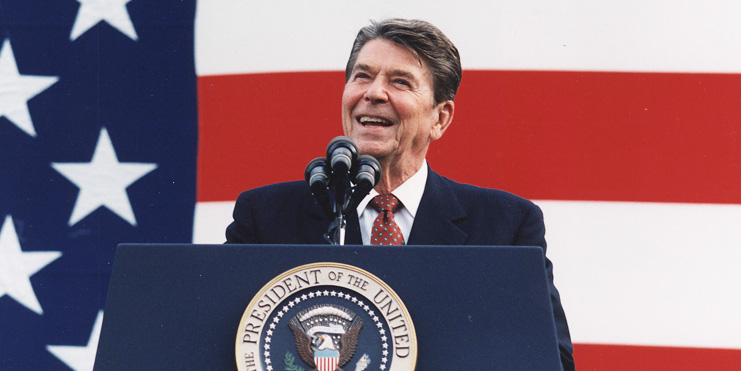Ronald Reagan didn’t set out with the intention to motivate or inspire people to serve their country as Jack Kennedy had done in the early sixties. He did not speak the language of idealism that Kennedy had done. He set out, I believe, to persuade people to accept his neo-conservative message which was based on a mixture of liberal economics, conservative social policy and patriotism tinted by fundamentalist Christianity. This is where Reagan’s genius lay, and why many called him “The Great Communicator”.

- Ronald Reagan was a charming grand style deliberate speaker. But unlike John Kennedy and Barack Obama with their Ciceronian type oratory, Reagan’s style was more intimate and personal.
- He engaged people partly with his attractive baritone voice and his immediate likeable character and polite behaviour.
- In his formal speeches, this tendency to engage his audiences, which is essential to persuasion. We hear and feel his natural friendliness and warmth and we find his text (content) geared to his audience’s need.
- He had a way with words, knew how to treat people well, and had the ability to tell a good story. From listening to his father young Ronald at an early age could tell a wonderful story.
- Reagan appeared to judge people as individuals and not their positions, titles or economic status . He gave the impression that he didn’t hold prejudices. This came through in his non-verbal behaviour as much as in his verbal communication.
- Reagan always saw himself as equal to others (he didn’t accept the Victorian idea of superior people). He acted the same way to everyone.
- According to Grauband, this behaviour made him more famous than all his years in Hollywood: “his youthful appearance, spontaneous manner, courtly relations, and gentle repartee with his many famous guests made him an appealing personality, familiar to millions of viewers” (Stephen Graubald, the President, Penguin Books, 2004, p. 500)
- Where did Reagan’s self-confidence come from? It came, commenters such as Kenneth Walsh say, from his belief that all men are equal, his belief in his own message, and from his positive outlook on the world.
- Kenneth Walsh quotes Michael Deaver, a media strategist working for the White House during Reagan’s first term, as saying, “Unlike Bill Clinton, President Reagan was comfortable with himself… You felt his feet were on the ground and he knew where he was going (Kenneth T. Walsh, Ronald Regan, Randon House, 1997, p 40). Similarly, Bill Pante of CBS reported in Walsh’s book, “Reagan did well because he was comfortable in his own skin to begin with, and utterly certain that what he was saying was right”.
- Not everyone thought well of either Reagan or his vision for America. One description I saw spoke of him in the following way: “A one-time actor, he became a passionate ideologue who preached a simple gospel of optimism, lower taxes, less government, and anti-communism. Often underestimated, his success in office surprised many” (Ibid, p 50).

